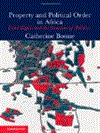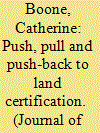|
|
|
Sort Order |
|
|
|
Items / Page
|
|
|
|
|
|
|
| Srl | Item |
| 1 |
ID:
165971


|
|
|
|
|
| Summary/Abstract |
Much of the promise of the good governance agenda in African countries since the 1990s rested on reforms aimed at ‘getting the institutions right’, sometimes by creating regulatory agencies that would be above the fray of partisan politics. Such ‘institutional fix’ strategies are often frustrated because the new institutions themselves are embedded in existing state structures and power relations. The article argues that implementing Kenya’s land law reforms in the 2012–2016 period illustrates this dynamic. In Kenya, democratic structures and the 2010 constitutional devolution of power to county governments created a complex institutional playing field, the contours of which shaped the course of reform. Diverse actors in both administrative and representative institutions of the state, at both the national and county levels, were empowered as ‘veto players’ whose consent and cooperation was required to realize the reform mandate. An analysis of land administration reform in eight Kenyan counties shows how veto players were able to slow or curtail the implementation of the new land laws. Theories of African politics that focus on informal power networks and state incapacity may miss the extent to which formal state structures and the actors empowered within them can shape the course of reform, either by thwarting the reformist thrust of new laws or by trying to harness their reformist potential.
|
|
|
|
|
|
|
|
|
|
|
|
|
|
|
|
| 2 |
ID:
080119


|
|
|
|
|
| Publication |
2007.
|
| Summary/Abstract |
The debate over land law reform in Africa has been framed as a referendum on the market - that is, as a debate pitting advocates of the growth-promoting individualization of property rights against those who call for protecting the livelihoods and subsistence rights of small farmers. This article argues that the prospect of land law reform also raises a complex bundle of constitutional issues. In many African countries, debates over land law reform are turning into referenda on the nature of citizenship, political authority, and the future of the liberal nation state itself. The article describes alternative land reform scenarios that are currently under debate, and identifies the constitutional implications of each. The practical salience of the issues is illustrated through reference to land reform politics in Côte d'Ivoire, Uganda, South Africa, and Tanzania
|
|
|
|
|
|
|
|
|
|
|
|
|
|
|
|
| 3 |
ID:
135023


|
|
|
|
|
| Publication |
New York, Cambridge University Press, 2014.
|
| Description |
xvi, 416p.Hbk
|
| Contents |
B
|
| Standard Number |
9781107040694
|
|
|
|
|
|
|
|
|
|
|
|
Copies: C:1/I:0,R:0,Q:0
Circulation
| Accession# | Call# | Current Location | Status | Policy | Location |
| 057955 | 323.46096/BOO 057955 | Main | On Shelf | General | |
|
|
|
|
| 4 |
ID:
180256


|
|
|
|
|
| Summary/Abstract |
Since 2000, many African countries have adopted land tenure reforms that aim at comprehensive land registration (or certification) and titling. Much work in political science and in the advocacy literature identifies recipients of land certificates or titles as ‘programme beneficiaries’, and political scientists have modelled titling programmes as a form of distributive politics. In practice, however, rural land registration programmes are often divisive and difficult to implement. This paper tackles the apparent puzzle of friction around rural land certification. We study Côte d'Ivoire's rocky history of land certification from 2004 to 2017 to identify political economy variables that may give rise to heterogeneous and even conflicting preferences around certification. Regional inequalities, social inequalities, and regional variation in pre-existing land tenure institutions are factors that help account for friction or even resistance around land titling, and thus the difficult politics that may arise around land tenure reform. Land certification is not a public good or a private good for everyone.
|
|
|
|
|
|
|
|
|
|
|
|
|
|
|
|
| 5 |
ID:
159551


|
|
|
|
|
| Summary/Abstract |
Land law reform through registration and titling is often viewed as a technocratic, good-governance step toward building market economies and depoliticising land transactions. In actual practice, however, land registration and titling programmes can be highly partisan, bitterly contentious, and carried forward by political logics that diverge strongly from the market-enhancing vision. This paper uses evidence from Côte d'Ivoire to support and develop this claim. In Côte d'Ivoire after 1990, multiple, opposing political logics drove land law reform as it was pursued by successive governments representing rival coalitions of the national electorate. Between the mid-1990s and 2016, different logics – alternatively privileging user rights, the ethnic land rights of autochthones, and finally a state-building logic – prevailed in succession as national government crafted and then sought to implement the new 1998 land law. The case underscores the extent to which deeply political questions are implicated in land registration and titling policies.
|
|
|
|
|
|
|
|
|
|
|
|
|
|
|
|
|
|
|
|
|